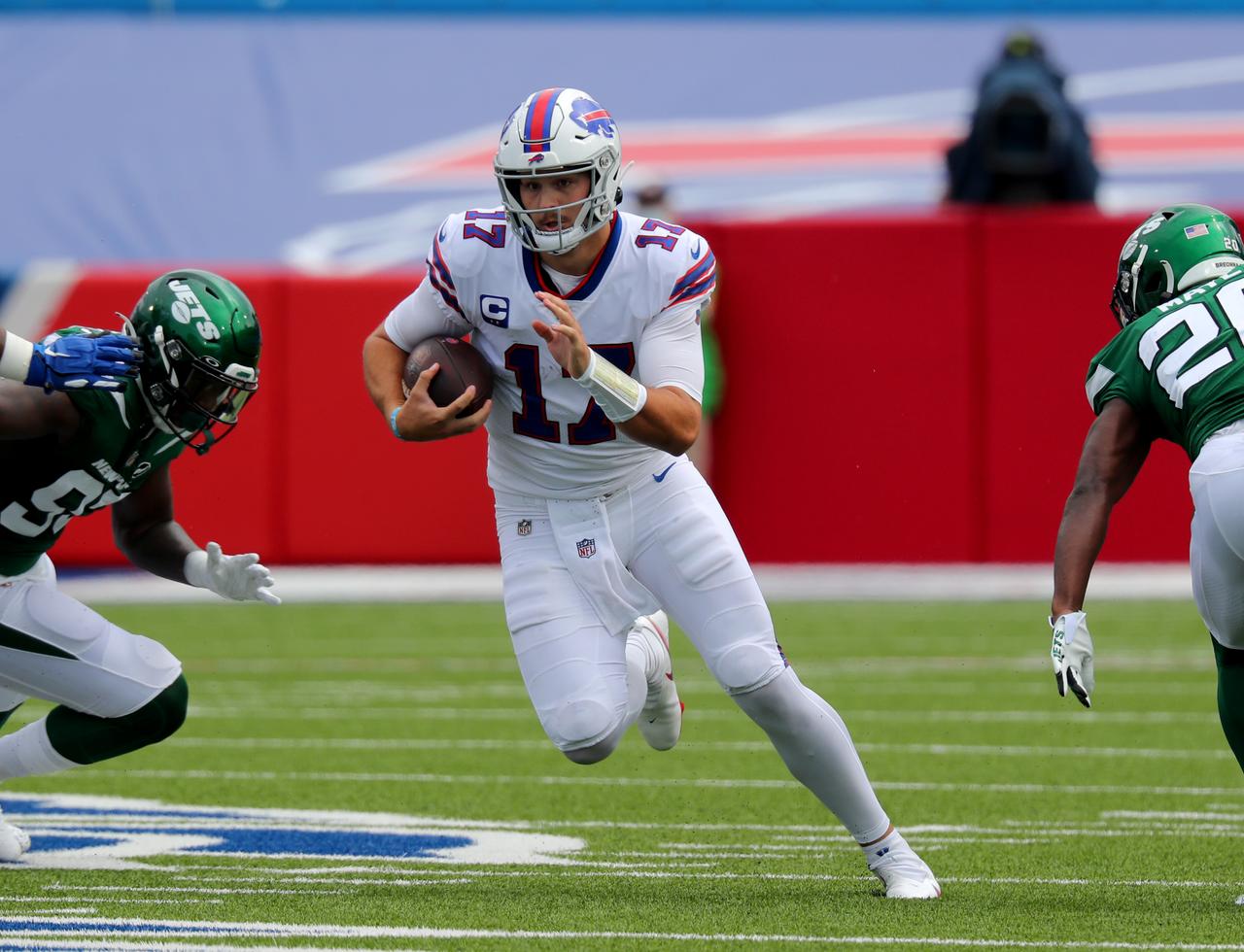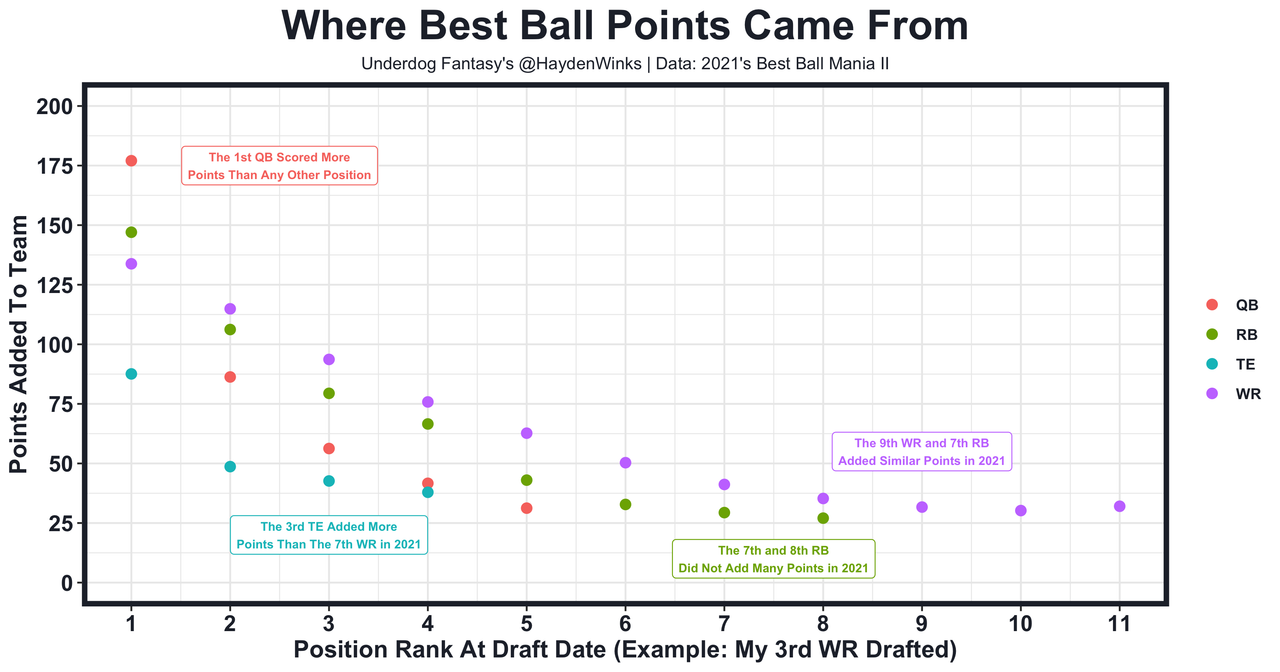I Drafted A Stud QB. Do I Need A QB3 Still?

Last week, I wrote QBs Are Undervalued On Underdog Fantasy after combing through the last two years of Best Ball Mania data. The short of it is that in half PPR, quarterbacks score relatively more points and the market as a whole hasn't adjusted yet. My research led me to ranking 10 of the top-11 quarterbacks ahead of ADP right now. My top-250 fantasy football rankings are here.
But the next part of the equation is: now that I'm going to be overweight on the early quarterbacks, should I draft a 3rd quarterback?

Based on this Best Ball Mania II chart, the short answer is yes. The QB3 drafted on a best ball team contributed more points to their team (56.3) on average than the RB6 (32.7) and WR9 (31.7) drafted. But these averages include data on teams that went three late-round quarterbacks and the purpose of this column is to look at if grabbing the 3rd quarterback in a stud quarterback build is smart.
Enter the Josh Allen case study.
Last year, Allen was drafted 48th overall on average (QB2 behind Patrick Mahomes), finished with the most fantasy points at the position, had a well above-average advance rate (22.2%), and was 6th overall in fantasy points over replacement. He was a +EV early-round quarterback, which is why I want to study his teams here.
Of the 12,948 teams who drafted Allen in Best Ball Mania II last year, 57% of them had a 2-QB build. 43% went with three quarterbacks, so it's generally an even split, though most touts believe two quarterbacks is best when going early-round quarterbacks.
This 2-QB or 3-QB debate really comes down to this: should we draft a QB3, a RB6, or a WR9? Of course there are exceptions with super-heavy WR builds, but for simplicity purposes this QB3 vs. RB6 vs. WR9 debate is more than good enough.

Among the Josh Allen only teams, the drafted QB3 added 44.7 points on average compared to 33.3 points for the RB6 and 32.1 points for the WR9. This edge remained when I filtered out really weird drafts and only looked at these QB3, RB6, and WR9 picks when they were drafted in rounds 15 through 18.
This 11-point gap in the Josh Allen study is smaller than the 25-point gap when looking at all quarterback teams in my initial chart because Allen was a stud. But the gap is still on the side of the QB3, not the RB6 or WR9.
"But Hayden, these are averages and we are playing tournaments were upside is what matters!!!" Agree, but the 80th percentile points added maintains a QB3 advantage (and so did the 90th percentile when I checked that, too). This happened in a year where late-round quarterbacks on the whole were bad. If we had a Justin Herbert, Lamar Jackson, or other late-round league-winning quarterback, the evidence would be stronger than it already is here.
And within this upside argument is the core root of correlation. Even if the QB3 was contributing similar points to the RB6 in these stud quarterback builds, we should want the added correlation of the quarterback position. For example, on a team with Jarvis Landry and Donovan Peoples-Jones, a Baker Mayfield QB3 selection adds more season-long and single-week upside to the entire best ball team than a one-off Jamaal Williams selection. In this interview with Spike Week's Erik Beimfohr, we discussed how having more smaller stacks is smart:
The last thing I want to note is the sample size issue when trying to find successful examples at each position. There were only 11 QBs last year who were drafted at least 1,000 times and had an ADP of over 180th overall, while there were 26 RBs and 30 WRs who fit these criteria. There are simply more options at those positions, so it's easier to find a Rashaad Penny or Amon-Ra St. Brown. But that doesn't mean breakouts don't happen at quarterback, too. In fact, here are some late-round quarterbacks who recently popped off in the fantasy playoffs:
2021 top-10 weekly QB scorers:
Week 15: Tyler Huntley (1st), Cam Newton (5th), Jared Goff (8th)
Week 16: Zach Wilson (4th), Josh Johnson (8th), Davis Mills (9th)
Week 17: Mac Jones (6th)
2020 top-10 weekly QB scorers:
Week 15: Jalen Hurts (1st), Justin Herbert (6th), Marcus Mariota (9th)
Week 16: Andy Dalton (4th), Mitchell Trubisky (8th), Brandon Allen (10th)
Week 17: Cam Newton (1st), Justin Herbert (3rd), Drew Lock (8th)
2019 top-10 weekly QB scorers:
Week 15: Ryan Fitzpatrick (7th), Dwayne Haskins (10th)
Week 16: Daniel Jones (1st), Andy Dalton (2nd), Ryan Fitzpatrick (3rd)
Week 17: Gardner Minshew (3rd), Ryan Fitzpatrick (4th), Baker Mayfield (7th)
Conclusion
It's somewhat contrarian to draft a third quarterback in 18-round best ball drafts, especially in early-quarterback builds. But the Josh Allen case study is initial evidence that a QB3 is still averaging more points than a RB6 or WR9 on stud quarterback teams. Drafting that third quarterback not only adds one dozen points across the best ball regular season, but it also adds uniqueness and correlation if done correctly, which is the combination that leads to profit in fantasy tournaments.